Odd Names
Three Ronald Legendres
When Ronald Legendre got married in 1995, his best man was also named Ronald Legendre, as was the judge who performed the service.None of this was exactly a coincidence. The best man and groom had met years before due to having the same last name (but they were genuinely best friends), and then they deliberately sought out the judge for the wedding.
Like Ronald Legendre, I have an uncommon last name. Thanks to Google, I know there are other Alex Boeses out there, but I've never met any of them. In fact, I've never met anyone (outside of family) who shares my last name. Though I recently discovered that there's a Boese Brothers Brewery in Albuquerque. I plan to check it out next time I'm in that neck of the woods.

Athol Daily News - Aug 14, 1995
Posted By: Alex - Sat Nov 16, 2024 -
Comments (2)
Category: Odd Names, 1990s, Weddings
Save the Baby does not actually save babies
Save the Baby is a cough and cold medicine first created back in 1874. Products continue to be sold under that brand name today.
But at a certain point in time (I'm not sure exactly when) the owners of the brand felt compelled to put the following disclaimer on the packaging:
An odd disclaimer because the name would definitely seem to imply that the product saves babies.

image source: lawhaha.com
Perhaps the disclaimer was a response to a 1929 suit against it by the FDA ("United States v. Certain Bottles of Lee's 'Save the Baby'") arguing that it was "misbranded."
Whatever the case may be, the disclaimer evidently allowed the name "Save the Baby" to continue to be used. And when the brand was sold to a new owner in 1983, the uniqueness of the name was a "major factor" in the deal. As the article below notes:

Newsday - Nov 17, 1983
Posted By: Alex - Wed Aug 21, 2024 -
Comments (2)
Category: Medicine, Odd Names
By 2531 everyone in Japan will be named Sato
Japanese demographics professor Hiroshi Yoshida has warned that by 2531 everyone in Japan will have the last name 'Sato'.Why? Because a) Sato is the most common last name in Japan, and b) Japanese law requires that married couples use the same last name. Because Japanese women almost always take their husband's name, this means that the surname 'Sato' is slowly crowding out all other names.
From the Guardian:
The Think Name Project is promoting Professor Yoshida's research as a way to gain support for ending Japan's law requiring couples to have the same surname.
More info: spoon-tamago.com/

Posted By: Alex - Thu Apr 04, 2024 -
Comments (3)
Category: Odd Names, Predictions, Science, Asia
Miss Grey Cup
Read about this beauty queen title here, with lots more pictures.What's great though is the local titles of the individual beauty queens competing for the overall title. Nothing evokes femininity like "Winnipeg Blue Bomber" or "Calgary Stampeder."
CANADA - NOVEMBER 25: In training: Entrants in the Miss Grey Cup contest worked out at the Toronto Women's Club yesterday. Left to right are Miss B.C. Lion Debbie Kushner; Miss Calgary Stampeder Sherri Brooks; Miss Hamilton Tiger Cat Angie Balogh; Miss Montreal Concorde Lynda Mercier; Miss Winnipeg Blue Bomber Kim Walls; Miss Saskatchewan Roughrider Leslie McNaughton; Miss Toronto Argonaut Suzanne Housego and Miss Edmonton Eskimo Betty Jandewerth.
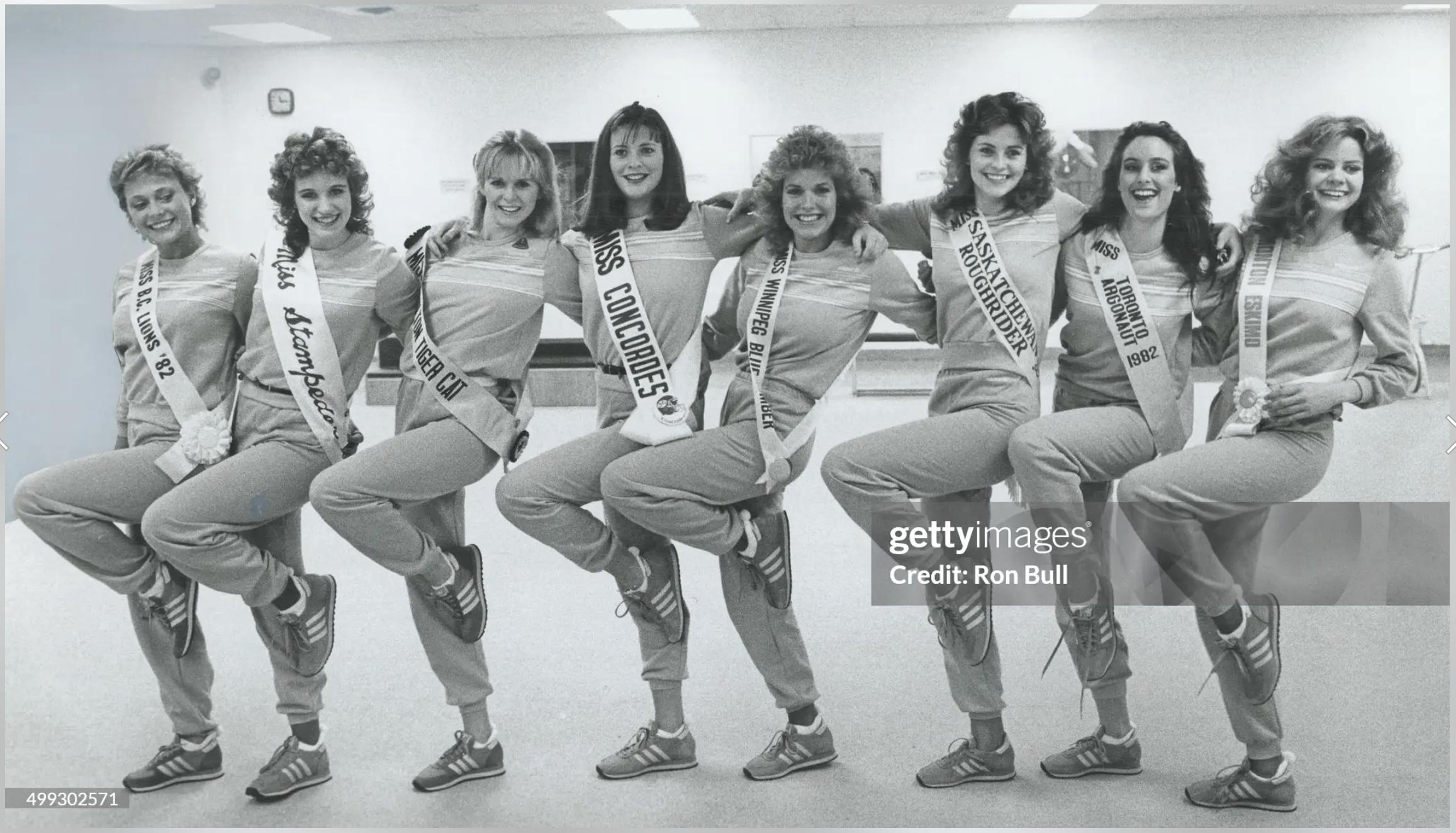
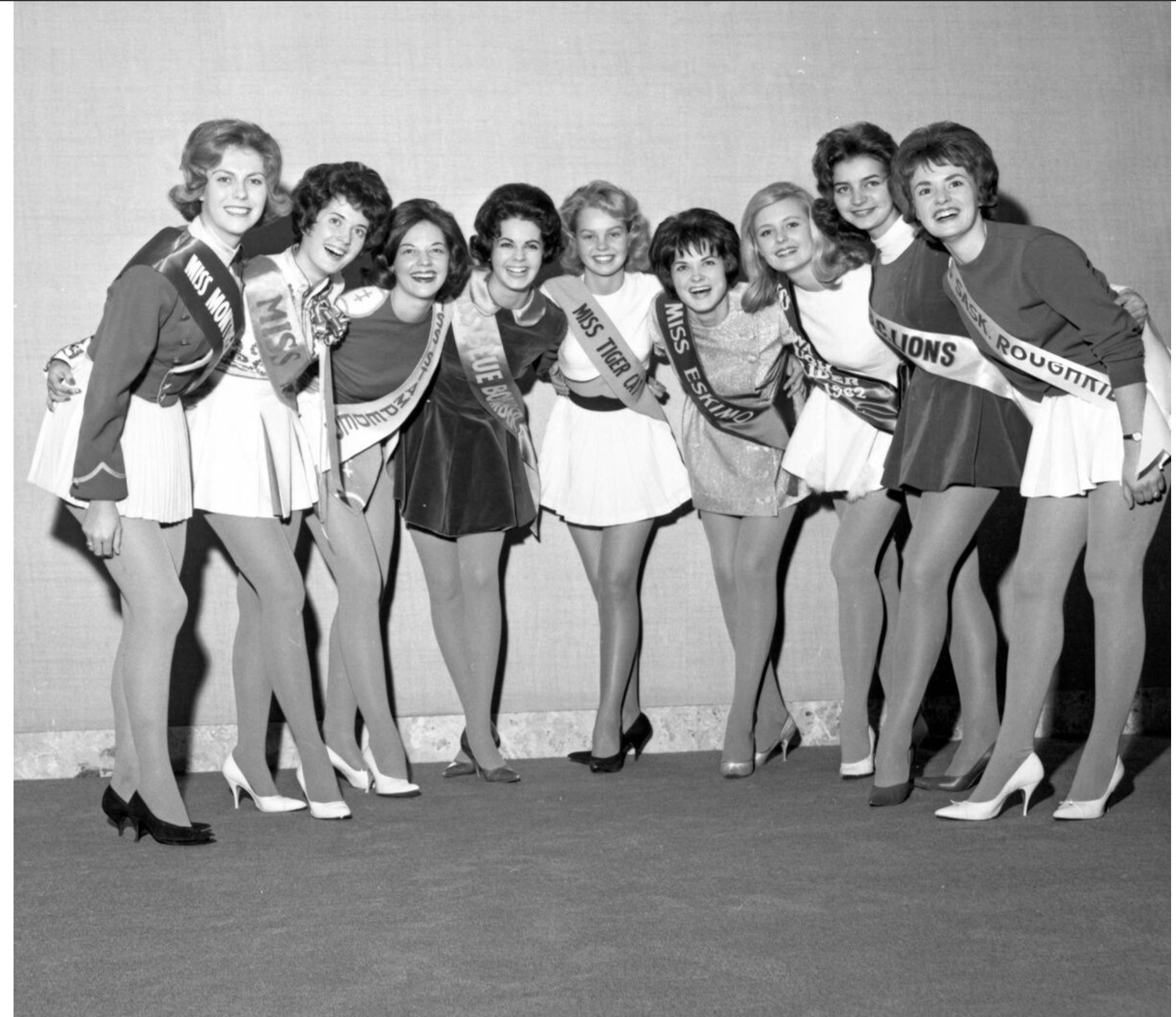
Posted By: Paul - Sun Feb 18, 2024 -
Comments (1)
Category: Awards, Prizes, Competitions and Contests, Beauty, Ugliness and Other Aesthetic Issues, Odd Names, North America, Twentieth Century
Kilty as charged
A case of being guilty of being Kilty.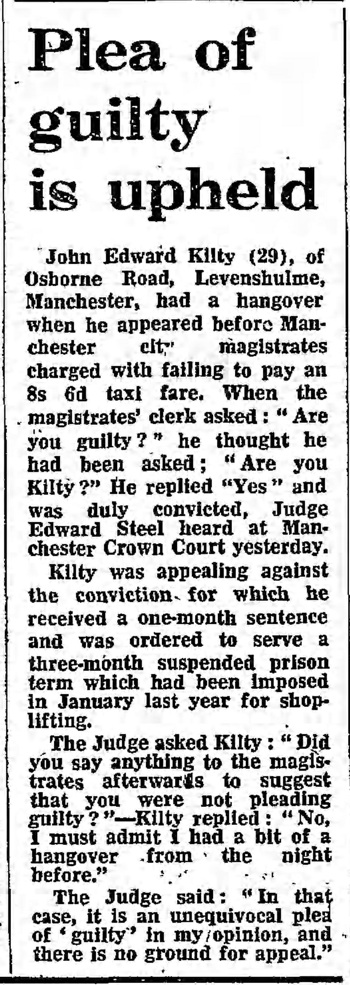
The Guardian - Feb 25, 1969
Posted By: Alex - Sat Feb 10, 2024 -
Comments (0)
Category: Law, Judges, Odd Names, 1960s
Women for Women International’s International Board Member
The title of this woman's position went a bit off the rail's rails.Her husband is a big political muckety-muck.

Posted By: Alex - Wed Jan 10, 2024 -
Comments (0)
Category: Jobs and Occupations, Odd Names
The Unhappy Mr. Happy Newyear
Happy Newyear was a carpenter who lived in Sleepy Eye, Minnesota. Technically his first name was 'Emil', but everyone, including his parents, had been calling him Happy since he was a child .The media found out about his unusual name sometime in the early 1940s, and from that point on Newyear would be hounded by reporters every New Year.
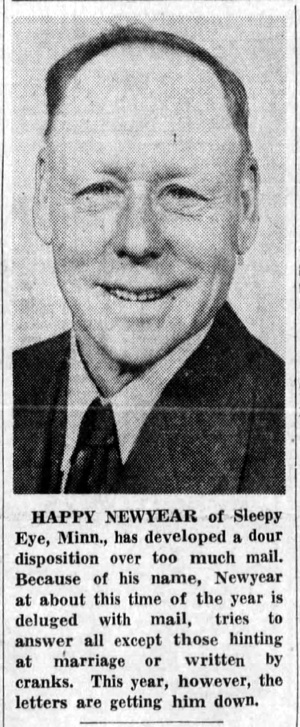
Minneapolis Star - Dec 31, 1943

Brantford Expositor - Jan 4, 1947
At first he reluctantly played along with it all. In 1947, he and his wife even participated in a New Year's show in Toronto. But as the years went by, it's evident he had had enough. By the 1960s, when reporters were still seeking him out each year, he would simply close the door in their face.



Sioux City Journal - Jan 2, 1960
I think 'Happy' or 'Hap' must be a fairly common nickname among people whose last name is Newyear. A quick search of cemetery records found two Newyears with the nickname 'Hap': Francis "Hap" Newyear and Harold "Hap" Newyear.
Posted By: Alex - Sun Dec 31, 2023 -
Comments (0)
Category: Odd Names, New Year
Miss Heating Comfort and the Whale Oil Company
The Whale Oil Company, which sponsored the Miss Heating Comfort contest, said it was looking to award the title to the girl "who makes temperatures rise when she enters a room."
Brooklyn Daily - Feb 10, 1961

Newsday - Oct 22, 1960
So did the Whale Oil Company actually sell whale oil? No, but apparently the name led a lot of people to assume that it did. I haven't been able to find out what became of the company, but I'm guessing that the name must have become an increasing liability with the rise of the "Save the Whales" movement in the late 1960s.

Brooklyn Daily Eagle - Nov 3, 1950
Posted By: Alex - Sun Nov 19, 2023 -
Comments (1)
Category: Awards, Prizes, Competitions and Contests, Odd Names, Fossil Fuels, Carbon Footprint, and Climate Change, 1960s
The Vibrators
A Pittsburgh pop-rock group from the 1970s. Not to be confused with the British punk rock band also known as The Vibrators.

Pittsburgh Post-Gazette - Jan 21, 1976
Posted By: Alex - Fri Oct 27, 2023 -
Comments (0)
Category: Music, Odd Names, 1970s
Child Shredded Meat
Chinese Innovation and Branding Leaps (2022):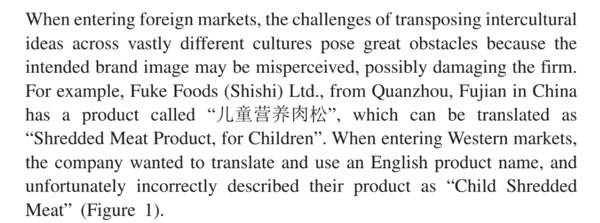

Posted By: Alex - Mon Oct 23, 2023 -
Comments (8)
Category: Food, Odd Names, Products, Children

| Who We Are |
|---|
| Alex Boese Alex is the creator and curator of the Museum of Hoaxes. He's also the author of various weird, non-fiction, science-themed books such as Elephants on Acid and Psychedelic Apes. Paul Di Filippo Paul has been paid to put weird ideas into fictional form for over thirty years, in his career as a noted science fiction writer. He has recently begun blogging on many curious topics with three fellow writers at The Inferior 4+1. Contact Us |




